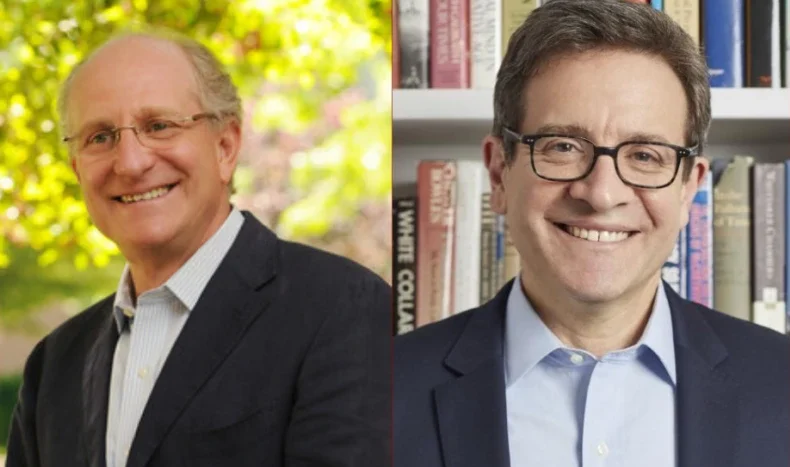
Penn Washington Names Inaugural Senior Fellows Julian Zelizer and Steven Pearlstein
The Senior Fellows will lead two programs focusing on higher education and Congress and policy.
Penn Washington, which serves as the physical and programmatic home for the University of Pennsylvania in the nation’s capital, is pleased to appoint distinguished scholars, The New York Times best-selling author Julian Zelizer and Pulitzer Prize-winning business and economics columnist Steven Pearlstein of The Washington Post, as Senior Fellows. The appointments also mark the launch of two new programs in D.C. set to foster innovative dialogue and research on the pressing issues shaping our world.
“Penn Washington represents a bold move on behalf of the University to bridge academia and policy,” says Ezekiel Emanuel, inaugural faculty director of Penn Washington. “These two projects are the first of several new initiatives that we are planning in the coming year.”
“The addition of Julian and Steve as the inaugural Senior Fellows reflects Penn Washington’s dedication to building a vibrant intellectual community that integrates diverse voices to explore nonpartisan policy solutions. Their tenure promises to not only catalyze discussions but also inspire innovative research and action addressing society’s most critical issues.”
Julian Zelizer, the Malcolm Stevenson Forbes, Class of 1941 Professor of History and Public Affairs at Princeton University, is renowned for his insightful analysis of American politics and history. His research delves into the connections between politics, policy, and media, and he is well-known for his engaging and thought-provoking work. Zelizer’s research frequently explores the dynamic forces shaping modern politics, influencing academic discussions, and public discourse.
As a Senior Fellow at Penn Washington, Zelizer will spearhead the Penn Project on Rebuilding Government-Higher Education Relations. Following the 2023-24 academic year, which saw a significant deterioration in relations between higher education institutions and Congress, the need to critically assess this relationship became even more urgent. While previous academic studies have examined discrete aspects, there has been limited focus on asking questions about the fundamental nature of the relationship, the factors leading to its disruption, and how it can be improved moving forward. The Penn Project on Rebuilding Government-Higher Education Relations aims to address these questions by reviewing the historical context and engaging scholars and officials in finding solutions. The new initiative will formally launch in December with a two-day conference.
“We plan to take a deep dive into the core elements that have shaped this relationship historically and to start putting forward a roadmap that can rebuild and reenergize this vital alliance,” says Zelizer.
Steven Pearlstein was a reporter, editor, and columnist at The Washington Post for 35 years and a professor of public affairs at George Mason University for more than a decade. At Penn Washington, he will lead the Fixing Congress initiative, drawing on his experience as both a congressional aide and journalist writing about public policy. The initiative aims to shine a spotlight on the degree of partisan gridlock and dysfunction in Congress, propose solutions, and foster a more cooperative and productive political culture at the Capitol.
Following the recent success of the inaugural conference at Penn Washington in April, the Fixing Congress initiative will focus on translating discussions into actionable reforms. Over the next two years, the initiative will convene a series of private and public gatherings to bring together current and former policymakers, academics, media, and reform advocates to explore and support practical strategies to enhance bipartisanship and improve legislative effectiveness.
“The dysfunction in Congress has reached the point that it now poses a serious threat to our democracy, our economy, and America’s status in the world,” says Pearlstein. “It is a credit to Penn—and to the legacy of Benjamin Franklin—that the university is taking the lead to address it by launching this initiative.”
About Penn Washington: Penn Washington serves as the physical and programmatic home for the University of Pennsylvania in the nation’s capital. The program’s main goals are to strengthen connections between federal and global policymakers and the Penn academic community, facilitate opportunities for Penn scholarship to influence policy, expand educational and academic programs focused on Washington, D.C., and emphasize the important contributions that Penn can make to the framework and operation of democracy and global affairs.